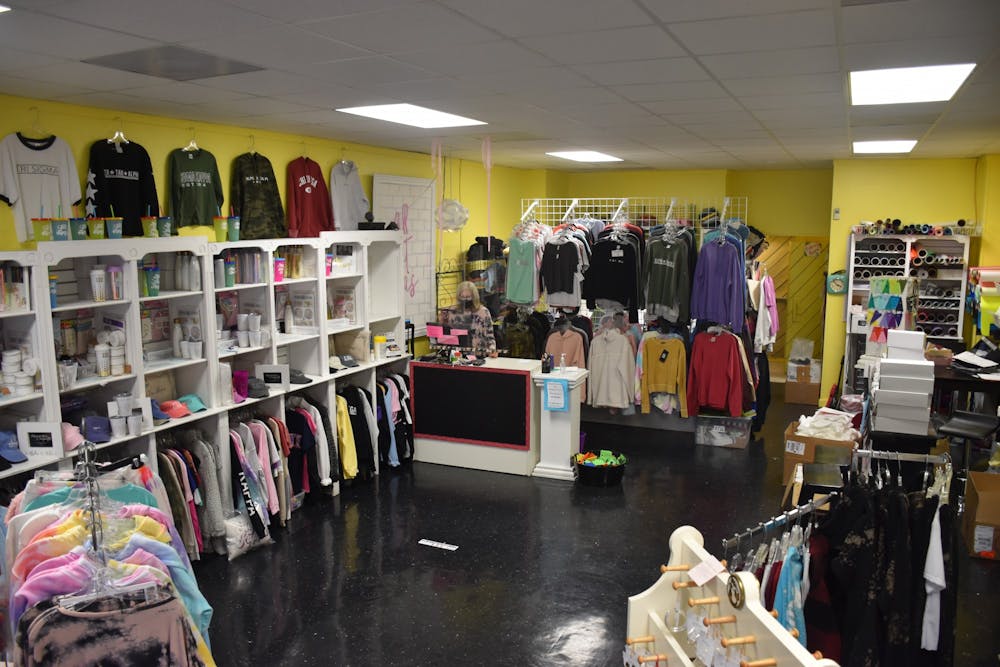Nearly two years since the peak of the pandemic, a supply chain crunch that was believed to be temporary is leaving business owners like Michaelle Graybeal, owner of Elon’s All that Jas, without stock.
A supply chain encompasses all of the activities and resources that go into a service. Across the globe, massive COVID-19 related supply chain disruptions are occurring with the container market, shipping routes, ports, trucking lines and warehouses. The result? Business owners are faced with shortages of key manufacturing resources, order backlogs, shipping delays and increases in product costs.
According to data released by Resilinic, a global leader in the supply chain risk monitoring space, disruptions due to supply shortages were up 638% in the first half of 2021.
All that Jas is a gift store and sorority store all in one. During the months of shutdown, Graybeal increased her online presence through social media and her Etsy shop, making those from out of state and across the country, regular clients. Yet once students returned to campus last fall, Graybeal found herself being confronted with a new set of economic challenges.
“I felt that we would be beyond this, but we’re not,” Graybeal said. “It is what it is. We just have to keep on going, keep moving forward.”
It’s a combination of delays, supply shortages and rising costs that continue to trouble businesses large and small. This is what is making it much more difficult for Graybeal to fill her larger group orders — she cannot find more than 100 shirts anywhere, sometimes she cannot even find 50.
“When we're doing group borders we might be ordering 150 shirts. Well, try to find 150 of the same shirts right now, it is a challenge,” Graybeal said. “I was literally yesterday, looking for a group, and it took six vendors all over the country to be able to find 150 shirts.”
According to Elon Supply Chain Management Professor K.C. Kasserman, the problem is that delays and product shortages caused by the pandemic continue to get worse, creating a domino effect of other economic issues.
“Wages for truck drivers and even ship workers are already going up, because it’s taking more money to entice people to work, which means transportation costs go up,” Kasserman said. “Additionally, since people are having problems getting products off of, let’s say ocean freight, they move to air, which costs more, which again raises prices — making retail consumer prices go up.”
Due to differences in volume, Elon Senior Lecturer in Supply Chain Management Coleman Rich, said small business owners are taking the brunt of the ongoing shipping delays.
“Let’s say that I’m a small business owner of a hardware store. Well because Home Depot has so much more volume, whatever they can get from overseas, they’re going to get,” Rich said. “They’re going to get their supply first and I’m going to get mine second. So in that case, there’s a lot of items that I just can’t get because the bigger box stores will get in first.”
To stay afloat, business owners mitigate risk. This is what Rich describes as finding creative ways outside of traditional means of getting products. For Graybeal, this means outsourcing to completely different vendors across the globe. Sometimes this even means compromising with the customer in terms of the details of their original order by potentially having to modify the shirt color, brand or style.
Graybeal says two organizations on-campus regularly place orders with her: Panhellenic and Sigma Kappa sorority. Elon junior Mel Jones is Sigma Kappa’s t-shirt chair and has been working with Graybeal since the start of the semester.
“They just do so much for our community,” Jones said. “It's important for people to remember to go order from them because obviously there's a lot of companies they could choose from, but it's better to support a local business.”
While business owners like Graybeal are pushing through these impacts for now, the supply chain, according to Rich, will eventually work itself out.
“All of this will eventually balance out, but it will take a considerable amount of time,” Rich said. “It’s just so unfortunate. It is unfortunate for the small business owners because, again, they’re being impacted a lot more than somebody like a Home Depot or Lowe’s.”
But there is something, according to Rich, that puts business owners like Graybeal ahead of some of the larger companies: customer service.
“We are all about customer service, so we're going to work super hard I think more than a lot of people would, to go that extra mile and make sure it happens, ” Graybeal said.
Ashlyn DeLoughy is also a member of Sigma Kappa, a sorority mentioned in this article.


